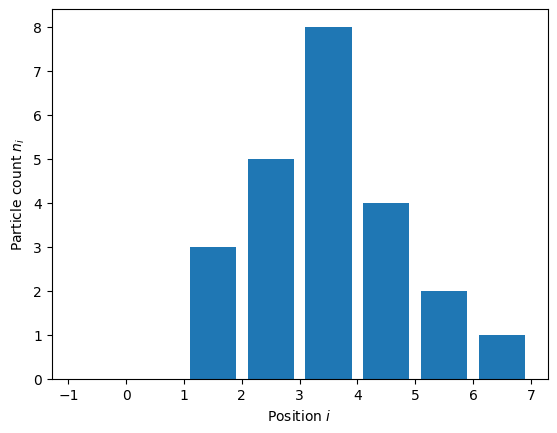5.3 Classroom exercise: energy calculation
Contents
5.3 Classroom exercise: energy calculation#
Estimated time for this notebook: 30 minutes
Diffusion model in 1D#
Description: A one-dimensional diffusion model. (Could be a gas of particles, or a bunch of crowded people in a corridor, or animals in a valley habitat…)
Agents are on a 1d axis
Agents do not want to be where there are other agents
This is represented as an ‘energy’: the higher the energy, the more unhappy the agents.
Implementation:
Given a vector \(n\) of positive integers, and of arbitrary length
Compute the energy, \(E(n) = \sum_i n_i(n_i - 1)\)
Later, we will have the likelyhood of an agent moving depend on the change in energy.
%matplotlib inline
import numpy as np
from matplotlib import pyplot as plt
density = np.array([0, 0, 3, 5, 8, 4, 2, 1])
fig, ax = plt.subplots()
ax.bar(np.arange(len(density)) - 0.5, density)
ax.xrange = [-0.5, len(density) - 0.5]
ax.set_ylabel("Particle count $n_i$")
ax.set_xlabel("Position $i$")
Text(0.5, 0, 'Position $i$')

Here, the total energy due to position 2 is \(3 (3-1)=6\), and due to column 7 is \(1 (1-1)=0\). We need to sum these to get the total energy.
Starting point#
Create a Python module:
%%bash
rm -rf diffusion
mkdir diffusion
touch diffusion/__init__.py
Windows: You will need to run the following instead
%%cmd
rmdir /s diffusion
mkdir diffusion
type nul > diffusion/__init__.py
NB. If you are using the Windows command prompt, you will also have to replace all subsequent %%bash directives with %%cmd
Implementation file: diffusion_model.py
%%writefile diffusion/model.py
def energy(density, coeff=1.0):
"""Energy associated with the diffusion model
Parameters
----------
density: array of positive integers
Number of particles at each position i in the array
coeff: float
Diffusion coefficient.
"""
# implementation goes here
Writing diffusion/model.py
Testing file: test_diffusion_model.py
%%writefile diffusion/test_model.py
from .model import energy
def test_energy():
pass
# Test something
Writing diffusion/test_model.py
Invoke the tests:
%%bash
cd diffusion
pytest
============================= test session starts ==============================
platform linux -- Python 3.8.18, pytest-7.4.4, pluggy-1.5.0
rootdir: /home/runner/work/rse-course/rse-course/module05_testing_your_code/diffusion
plugins: cov-4.1.0, anyio-4.4.0, pylama-8.4.1
collected 1 item
test_model.py . [100%]
============================== 1 passed in 0.01s ===============================
Now, write your code (in model.py), and tests (in test_model.py), testing as you do.
Solution#
Don’t look until after you’ve tried!
In the spirit of test-driven development let’s first consider our tests.
%%writefile diffusion/test_model.py
"""Unit tests for a diffusion model."""
from pytest import raises
from .model import energy
def test_energy_fails_on_non_integer_density():
with raises(TypeError):
energy([1.0, 2, 3])
def test_energy_fails_on_negative_density():
with raises(ValueError):
energy([-1, 2, 3])
def test_energy_fails_ndimensional_density():
with raises(ValueError):
energy([[1, 2, 3], [3, 4, 5]])
def test_zero_energy_cases():
# Zero energy at zero density
densities = [[], [0], [0, 0, 0]]
for density in densities:
assert energy(density) == 0
def test_derivative():
from numpy.random import randint
# Loop over vectors of different sizes (but not empty)
for vector_size in randint(1, 1000, size=30):
# Create random density of size N
density = randint(50, size=vector_size)
# will do derivative at this index
element_index = randint(vector_size)
# modified densities
density_plus_one = density.copy()
density_plus_one[element_index] += 1
# Compute and check result
# d(n^2-1)/dn = 2n
expected = 2.0 * density[element_index] if density[element_index] > 0 else 0
actual = energy(density_plus_one) - energy(density)
assert expected == actual
def test_derivative_no_self_energy():
"""If particle is alone, then its participation to energy is zero."""
from numpy import array
density = array([1, 0, 1, 10, 15, 0])
density_plus_one = density.copy()
density[1] += 1
expected = 0
actual = energy(density_plus_one) - energy(density)
assert expected == actual
Overwriting diffusion/test_model.py
Now let’s write an implementation that passes the tests.
%%writefile diffusion/model.py
"""Simplistic 1-dimensional diffusion model."""
from numpy import array, any, sum
def energy(density):
"""Energy associated with the diffusion model
:Parameters:
density: array of positive integers
Number of particles at each position i in the array/geometry
"""
# Make sure input is an numpy array
density = array(density)
# ...of the right kind (integer). Unless it is zero length,
# in which case type does not matter.
if density.dtype.kind != "i" and len(density) > 0:
raise TypeError("Density should be a array of *integers*.")
# and the right values (positive or null)
if any(density < 0):
raise ValueError("Density should be an array of *positive* integers.")
if density.ndim != 1:
raise ValueError(
"Density should be an a *1-dimensional*" + "array of positive integers."
)
return sum(density * (density - 1))
Overwriting diffusion/model.py
%%bash
cd diffusion
pytest
============================= test session starts ==============================
platform linux -- Python 3.8.18, pytest-7.4.4, pluggy-1.5.0
rootdir: /home/runner/work/rse-course/rse-course/module05_testing_your_code/diffusion
plugins: cov-4.1.0, anyio-4.4.0, pylama-8.4.1
collected 6 items
test_model.py ...... [100%]
============================== 6 passed in 0.09s ===============================
Coverage#
With pytest, you can use the “pytest-cov” plugin to measure test coverage
%%bash
cd diffusion
pytest --cov
============================= test session starts ==============================
platform linux -- Python 3.8.18, pytest-7.4.4, pluggy-1.5.0
rootdir: /home/runner/work/rse-course/rse-course/module05_testing_your_code/diffusion
plugins: cov-4.1.0, anyio-4.4.0, pylama-8.4.1
collected 6 items
test_model.py ...... [100%]
---------- coverage: platform linux, python 3.8.18-final-0 -----------
Name Stmts Miss Cover
-----------------------------------
__init__.py 0 0 100%
model.py 10 0 100%
test_model.py 33 0 100%
-----------------------------------
TOTAL 43 0 100%
============================== 6 passed in 0.14s ===============================
Or an html report:
%%bash
#%%cmd (windows)
cd diffusion
pytest --cov --cov-report html
============================= test session starts ==============================
platform linux -- Python 3.8.18, pytest-7.4.4, pluggy-1.5.0
rootdir: /home/runner/work/rse-course/rse-course/module05_testing_your_code/diffusion
plugins: cov-4.1.0, anyio-4.4.0, pylama-8.4.1
collected 6 items
test_model.py ...... [100%]
---------- coverage: platform linux, python 3.8.18-final-0 -----------
Coverage HTML written to dir htmlcov
============================== 6 passed in 0.16s ===============================
The HTML coverage results will be in diffusion/htmlcov/index.html

